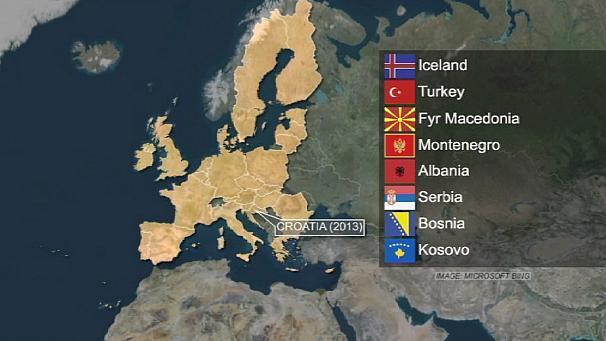And now, what about EU enlargement?

‘Enlargement’. A usual word in the European history. And a usual word in our current European context.
Europe is certainly much older than its nations. The “United Europe” is not a present concept, neither political nor economical. It is the ideal pursued by several intellectuals for over a thousand years. The intention of Founding Fathers like Jean Monnet or Robert Schuman was always to design a system that would integrate those democratic countries resolved to be part of this common project. However, the concept of Europe is now in an unstable equilibrium. It is heavily damaged by its undeniable loss of power and influence in the international sphere.
In the context of European weakness, ten years have passed since the EU’s largest Enlargement. An enlargement which supposed a revolution in many ways due to the characteristics of the countries adhering to the EU. Nevertheless, to the necessity of an enlargement process it should be added another one: the gradual transition towards a more mature and complete palette of EU actions and institutions. This process is called deepening. The dilemma widening-deepening has always been associated to the EU enlargement process, but it has acquired even more relevance since 2004 because of the diversity of national interests.
Therefore, ten years after this widening, the European Union will freeze expansion over the next five years. Jean-Claude Juncker, elected as president of the European Commission, has spoken about this issue several times, but the confirmation came on July 15. In his speech preceding the vote, he confirmed that no new countries were expected to join the Union over the next five years. And according to him, “the EU needs to mark a pause in its enlargement process so that we can consolidate what has been done with 28.”
However, the widening door is not locked for candidate countries, Juncker has left it ajar. In his “A New Start for Europe” Agenda, he recognises that enlargement has been a success story that brought peace and stability to our continent. In addition, Juncker promises that ongoing negotiations will continue, and notably the Western Balkans will need to keep a European perspective. Relating to this, he highlights the need of stepping up close cooperation, association and partnership to further strengthen the economic and political ties with countries in the Eastern Neighbourhood. Perhaps, this is one of the paths to reach the “stronger overall presence by the EU on the international scene” which Juncker calls for.
Juncker is not alone in his position against short-term enlargement. Martin Schulz, the European social democrat leader and currently president of the European Parliament, said during the first German TV duel between himself and Juncker that “we cannot cope with any enlargement rounds in the foreseeable future”. This is his current stance concerning this issue despite his remarks on other occasions, when he praised the magnificent results of the European widening process, like on the 10th anniversary of the European Union’s eastern enlargement:
“[Enlargement] was a historic event that moved Europe towards a final reunification and reconciliation after the end of the Cold War. It crowned the transition of many central and eastern European countries from communist rule and the command economy to democracy and the free market. It expanded the zone of stability, security, freedom and prosperity on our continent.”
In the very same week of Juncker’s designation, the Chancellor Angela Merkel visited Dubrovnik for a summit with eight leaders from South-eastern Europe. There, she claimed the clear prospect of Balkan countries of joining the EU. In addition, she said that those countries have a strong ally in Berlin. Are you changing your mind, Angela? In 2009, the German leader made headlines when she said that the EU needs to “consolidate” before the bloc can take on new members. In those days, Berlin put the brakes on Montenegro’s candidature. The country submitted its membership application in December 2008, but after Merkel’s remarks, EU foreign ministers asked the European Commission to verify Montenegro’s willingness to become a candidate. Therefore, Germany blocked the process and the Balkan countries perceived it as a setback which delayed its potential entry to the EU.
As we have seen, all these European leaders tend to think that enlargement is wonderful in general terms, but reality shows us that it is unlikely to happen in the next few years. Perhaps, Juncker’s ideas are right and one of the ways to regain the trust of citizens is to go in depth and digest the last incorporations in order to guarantee a better functioning. Will Juncker achieve his goal of “citizens falling in love again with Europe” as he said in the speech before the vote? Only time will tell…
Patricia Gamarra